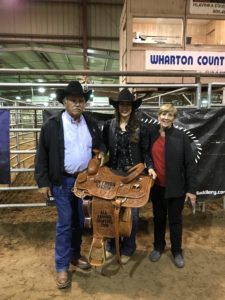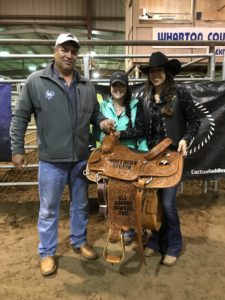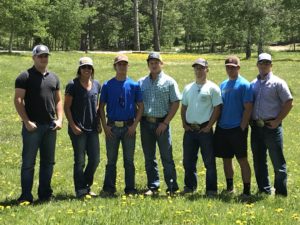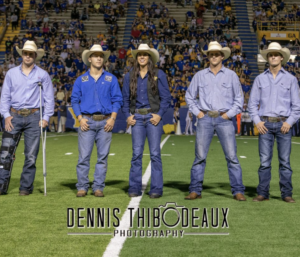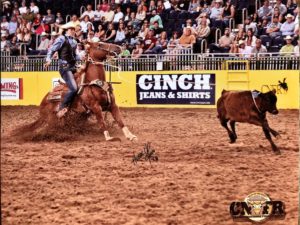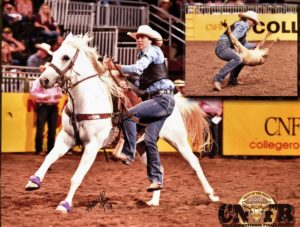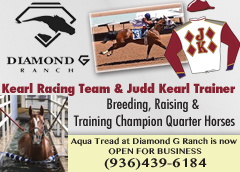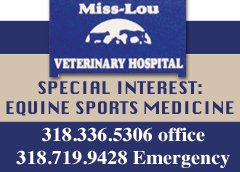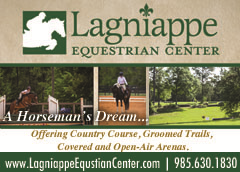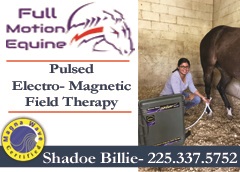by Barbara Newtown.
When Mia Manzanares was a freshman at McNeese State University in Lake Charles, Louisiana, she tore her ACL while practicing for the National Intercollegiate Rodeo Association competitions. The “anterior cruciate ligament,” one of four ligaments that stabilize the knee, attaches the shinbone to the thighbone and keeps the shinbone from moving too far forward. The ACL is a common site for sports injuries. Sprains or tears occur most often during sudden stops. The activities that invite ACL injuries are hard-charging sports like basketball, soccer, football, and rodeo. Mia’s rodeo specialty is goat-tying… a timed event which involves galloping out of the chute towards a tethered goat, balancing on your horse’s side and leaping off at the perfect moment, flipping the goat over, and tying up three of its legs.
According to the U. S. Center for Sports Medicine, someone with a torn ACL can experience the following symptoms:
1. Popping sounds coming from the knee.
2. A knee cap in a place it shouldn’t be.
3. Stumbling and falling.
4. Fluid buildup and bruising.
5. Pain, ranging from subtle to extreme.
6. Limited range of motion.
7. Weakened thigh muscles.
Seven Self-Administering Tests to Know If You've Torn Your ACL
Mia is a tough competitor, and a torn ligament didn’t stop her. She continued to practice and to enter three more rodeos and to qualify for the National College Rodeo Finals. There’s a tradition in rodeo of shrugging off injuries that would put a “normal” person in surgery the next day.
After the college rodeo season ended, Mia turned her attention to her damaged knee. She says, “I had reconstructive surgery with Dr. Tandy Freeman in Dallas, Texas. He is super—he knows rodeo athletes very well. He knows how we are: we all want to get back to our sport and keep doing it no matter what!”
Although Dr. Freeman grew up in a Texas ranching community, he’d never been a rodeo competitor. When he was a resident in orthopedic surgery at UT Southwestern Medical Center in Dallas, his mentor was Dr. J. Pat Evans. Dr. Evans, along with Don Andrews, Head Trainer of the New York Islanders’ hockey development club, formed the Justin Sportsmedicine Team in 1980 to tend to injured rodeo athletes. These days the Team combines the expertise of health professionals and medical centers with a fleet of specially staffed mobile units to provide emergency care at over 120 rodeos each year. The Team is trained to respond fast and stabilize the specific kinds of injuries that rodeo competitors encounter.
When Dr. Evans was ready to retire from administering the Justin Sportsmedicine Team, he picked Dr. Freeman to be the Medical Director. Dr. Freeman has come to admire the dedication and resilience of rodeo performers. In an interview with Western Horseman magazine, Dr. Freeman said, “Most rodeo athletes went to the doctor only if they were more or less forced to. The joke is that before the [Justin] program started, rodeo sports medicine was basically a bottle of aspirin and a six-pack of beer, and if that didn’t work you doubled up on the beer!” The Justin Sportsmedicine Team not only rushes to the sides of injured cowboys as they lie in the arena dirt; the Team also trains competitors how to care for their bodies with taping, bracing, stretching, exercise, and sensible nutrition. Dr. Freeman pointed out in the Western Horseman interview that the Justin Boot Company pays for everything the Team needs, from bandages to salaries to vehicles. Still, the Justin Sportsmedicine Team can only attend a tenth of the rodeos in the nation.
Dr. Freeman said that of the orthopedic injuries in rodeo, the knee is at the top of the list. Concussion leads all rodeo injuries, and most concussions occur in bull and bronc riding. Helmets reduce the incidence of skull fracture, but concussions are the result of the brain bouncing inside the skull; helmets can’t prevent concussions. One of the unusual aspects of rodeo injuries, compared to those sustained in other sports, is that the torso suffers the sort of damage that usually is seen in car accidents, such as a lacerated spleen or liver. (Read all of Dr. Freeman’s interview at https://westernhorseman.com/culture/tandy-freeman-md/ )
Meeting Dr. Freeman – and having Dr. Freeman repair her ACL so well that her “fixed” knee feels better than her unhurt knee – has concentrated Mia’s mind on her future. She is majoring in Health and Human Performance. Her goal is to complete a doctorate in Physical Therapy and work for the Justin Sportsmedicine Team. “I hope with in-depth training I can tell patients exactly what’s wrong, why it happened, and what to do to get better,” she says.
“All the professors in my department are amazing. This semester I can’t get enough of their courses: exercise physiology, evaluation of upper extremity injuries, and rehabilitation exercises. I’m showing up for the teachers’ office hours a lot, just talking to them about everything!” Her senior year is challenging: she has chemistry and physics both semesters. “Physics is hard, but I enjoy it. Physics will tie in great with physical therapy: it’s about torque and acceleration and velocity. I really haven’t had a class that I don’t like, because I love all knowledge! I want to learn as much as possible.
“Time management is a huge thing,” Mia says. “I have my calendar always open and I have to label everything that I have to do each day.” She’s managing her time successfully: she has maintained a 4.0 GPA for the last three or four semesters.
Another aspect of time management that most college athletes don’t have to worry about is caring for horses. Mia has four of her own: two competition mounts and two colts that she is training. McNeese doesn’t provide grooms or barn help for the students, or even transportation to rodeos. Every day Mia must clean her horses’ stalls, check their water, turn them out and bring them in, and, of course, ride. When academic life gets too pressing, the members of the rodeo team help each other out by picking up extra barn chores or even by exercising each other’s horses.
Mia was nervous about starting college in general, but she wasn’t nervous about starting her college rodeo career. “All the girls on the college team were the same people I’d been competing against since high school and junior high,” she says. “We’re all really good friends… we’re like a family, more of a family than in any other sport I’ve competed in.”
She feels blessed to have the support of her real Manzanares family, too. She grew up breathing rodeo: her grandparents Kiko and Joann Manzanares, their children Pancho and Juanita and their spouses, and the four grandchildren (including Mia) all occupy a compound of homes, paddocks, barn, and an arena for practicing rodeo skills. She says that her loved ones have made rodeo, college, and career plans easy for her. In practical terms, the rodeo skills she started learning as early as age three, when her grandfather first set her on a horse, have earned her a generous athletic scholarship at McNeese University. Most important, the Manzanares work ethic will guide her throughout her life.
Mia is proud and grateful that she was able to qualify for the College National Finals Rodeo three years in a row, as a freshman (2016, the year of the knee), as a sophomore (2017), and as a junior (2018). The 2018 CNFR proved that Mia has the skill and the cool to claim the top spot in her sport.
Over 400 students from 100 colleges and universities showed up this June for the Finals in Casper, Wyoming. The National Intercollegiate Rodeo Association divides the nation into eleven regions. McNeese is in the Southern Region, a traditionally tough group, with heavyweight rodeo schools like Texas A & M, Tarleton State University, and Sam Houston State University in the mix.
The college rodeo events for women are barrel racing, goat tying, and breakaway roping. Men compete in saddle bronc riding, bareback riding, bull riding, tie-down roping, steer wrestling, and team roping. McNeese qualified six men and one woman – Mia.
The top twelve competitors in each event meet on the last night of the Finals week to determine the national champions, the men’s and women’s All-Around champions, and the team champions. This year, Mia’s goat tying performance was excellent: she earned two second places earlier in the week and clinched the title of Champion in goat tying with the fastest time of the competition: 5.9 seconds.
In breakaway roping, Mia squeaked into the final night lineup by being consistent. Although she had finished no higher than thirteenth in any of her earlier runs, her times were almost identical and she ended up in ninth place. Her final round was jaw-dropping: she tied the arena record of 1.7 seconds. These wins in goat tying and breakaway made Mia the undisputed Women’s All-Around Champion. Her wins were so impressive that she delivered the Women’s Team Championship to McNeese State University… as the ONLY member of the McNeese women’s team at the 2018 College National Finals Rodeo.
Mia credits her horses with a large part of her success in collegiate rodeo. Casper, 22 years old, is the goat tying expert: he’s a registered white Quarter Horse with a quirk or two. “He’s a pain in the butt!” says Mia. “He kicks the trailer when we haul. He’s cribbed all his teeth off! But he does his job very, very well, and I couldn’t do anything without him. He runs straight and hard the whole time my body weight is on one side of him. He gets really excited and prancey before we go. His whole body language changes when he sees a goat!”
Her roping horse is a tiny, unpapered sorrel mare named Peanut, but everyone usually calls her “the rope mare.” Mia got the mare during her senior year in high school and had no idea how old the horse was. When Mia had the mare’s teeth floated, she found out that the mare was at least 22 years old… and perhaps even 23 or 24. Age doesn’t get in the way of Peanut’s speed, as her CNFR breakaway time of 1.7 seconds proves. “She has a huge heart,” says Mia.
Mia is indebted to her sponsors. In particular, she credits Lonestar Feed for keeping Casper and Peanut as fast as horses just fractions of their ages. Her sponsors include Resistol hats, Panhandle Western Wear, Rock and Roll Denim, T-Pop Leather Shop (owned by her uncle Todd Broussard), and YNot Lifestyle. Mia is moved by the story behind the YNot apparel company: the founder, Cody Moran, lost the use of his legs in a car crash… and then battled cancer. “He survived and started his business. His mottos are ‘live life over the edge’ and ‘live life like there’s no tomorrow.’ It’s really, really inspiring.”
Mia, rodeo star and future therapy angel for rodeo stars, brings those mottos to life.
(Photos courtesy Mia Manzanares)

